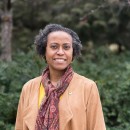Public Engagement News
Pages
- Sonia Harb Sees Equity and Stability in Governor Whitmer’s 2022 Proposals
ENGAGE: Detroit Strategist Sonia Harb argues in Crain's Detroit Business editorial that the proposals Governor Whitmer outlined in the 2022 State of the State address can provide equity and stability for Michigan workers.
“As the governor emphasized multiple times, there needs to be a multi-pronged approach to solving a particular problem. We can't solve child care problems by only subsidizing the cost of care—we need to also support the provider network and care providers. Her systems approach to problem-solving shows she understands the complex problems facing our state and its residents, and what is needed to solve them,” writes Harb.
- February 9, 2022
- Learn more »
 Trina Shanks’ Editorial in Detroit Free Press Encourages Home Ownership in Detroit
Trina Shanks’ Editorial in Detroit Free Press Encourages Home Ownership in DetroitThe conventional mortgage market is not working in Detroit, writes Professor Trina Shanks in a Detroit Free Press editorial. Shanks and her co-authors recommend new programs to support homebuyer education programs and establish a single-family residential rehabilitation fund. “We know the private mortgage market does not serve Detroit in the same way as it does adjacent communities. The evidence is indisputable,” writes Shanks. The article cites data reviewed by the Center for Equitable Family and Community Well-Being that shows that vast swath of Detroit, identified by neighborhood, see very little mortgage lending activity in relation to residential property sales. “We are in a once in a lifetime moment, where substantive federal investments are flowing into Detroit. Let's focus these infrastructure investments in a way that benefits Detroiters.
- January 17, 2022
- Learn more »
 Sunggeun (Ethan) Park Elected Treasurer of the Society for Social Work and Research
Sunggeun (Ethan) Park Elected Treasurer of the Society for Social Work and ResearchAssistant Professor Sunggeun (Ethan) Park has been elected treasurer of the Society for Social Work and Research. In his vision statement, Park listed the following goals: maintaining fiscal accountability and responsibility; promoting inclusive and transparent fiscal decision-making processes and representing the voices of early-stage scholars with marginalized identities and interests. Park will begin his term on February 1.
- January 4, 2022
 Trina Shanks Named Fellow of the American Academy of Social Work and Social Welfare
Trina Shanks Named Fellow of the American Academy of Social Work and Social WelfareTrina Shanks was named a Fellow of the American Academy of Social Work and Social Welfare. The Academy is an honorific society of distinguished scholars and practitioners dedicated to achieving excellence in the field of social work and social welfare through high-impact work that advances social good. Fellow status is among the highest professional accolades bestowed to social work scholars; Michigan Social Work now has 12 academy members. Shanks is the School of Social Work Community Engagement Director and Harold R. Johnson Collegiate Professor of Social Work.
Register for the 6-7 PM, January 19, 2022
Registrants will receive the Zoom link one week prior to the event.
- November 17, 2021
- Charles Williams II Spearheaded Emergency Response to COVID-19 for Detroiters
Joint PhD student Charles Williams II is the subject of a new “This is Michigan” video, which chronicles the emergency response program Williams spearheaded during the early days of the COVID-19 pandemic. The School of Social Work partnered with the Historic King Solomon Baptist Church in Detroit, where Williams is the pastor, to care for those in the community who were hit hard by the shutdown. School of Social Work students worked emergency hotlines, manned food banks and conducted wellness checks. Entitled “Caring Throughout Crisis,” the video also features Professor Trina Shanks.
- November 9, 2021
- Learn more »
- Brittney Barros Briefs Congress on Foster Care Legislation
Brittney Barros, dual MSW and MPP student, will brief Congress this week on the Protecting Sibling Relationships in Foster Care Act, legislation which Barros developed as a 2018 intern with the Congressional Coalition on Adoption Institute (CCAI). Barros speaks this Thursday, November 4, 2021 at 1 PM. Register to watch the livestream of the briefing.
While current federal law requires states to make a reasonable effort to place siblings together in the foster care system, a majority of siblings are separated. This bill would authorize the Department of Health & Human Services to establish a pilot program to develop foster care programs designed specifically for sibling groups with large numbers, wide age ranges and complex needs.
"Sibling bonds are truly one of a kind. They entail some of the darkest secrets and impeccable loving memories, share valuable life lessons and are the longest-lasting relationships of a lifetime," said Barros. "Siblings bleed the same blood together, cry the same tears together, and fulfill life's destiny together. They are each other's best friends, shoulders to cry on and truly shape life's adversities and achievements. Foster youth deserve this one-of-a-kind bond which should not be taken by a broken system."
Barros speaks from her own lived experience: she was separated from her siblings for more than six years. During her internship with the CCAI, Barros worked on policy reports. "One of my recommendations about keeping siblings together was copied right into the language of the bill," she said. "I took my trials and trauma and turned it into testimony."
"Siblings are the longest relationship of a lifetime and, as social workers, we talk about the importance of human relationships. Those are core values in our [National Association of Social Workers] Code of Ethics and they are core values of mine."
Barros has a BSW from Eastern Michigan University and is pursuing a joint MSW and MPP at the University of Michigan. "I really wanted to go into social work specifically because I had a foster care worker that didn't treat me well. She did everything that we learn in social work school not to do, and she actually fueled my fire to be a social worker, and be the social worker that I never got to have."
- November 2, 2021
- Learn more »
 Justin Hodge Appointed by Governor Whitmer to Community Action and Economic Opportunity Commission
Justin Hodge Appointed by Governor Whitmer to Community Action and Economic Opportunity CommissionClinical Assistant Professor Justin Hodge, MSW ‘13, has been appointed by Governor Gretchen Whitmer to the Commission on Community Action and Economic Opportunity. The commission was created to develop policies and programs to reduce poverty in the State of Michigan. “I'm excited to be able to inform and influence policy at the state level to expand economic opportunity for our most vulnerable Michiganders,” said Hodge.
- October 26, 2021
- Learn more »
 Terri Friedline’s Research on Postal Banking Featured in The Conversation
Terri Friedline’s Research on Postal Banking Featured in The ConversationAssociate Professor Terri Friedline discusses her research in The Conversation on how postal banking could provide a financial lifeline to the millions of Americans without a bank account.
According to data, 24% of U.S. census tracts have neither a community bank nor a credit union branch, leaving 21 million people "underbanked." The lack of affordable banking creates real hardships that disproportionately hurt low-income Americans and communities of color. Without a bank account, people pay higher fees and interest rates, have a harder time building credit history and are less able to get mortgages and other kinds of loans, writes Friedline.
- July 13, 2021
- Learn more »
 Justin Hodge on How Cannabis-based Taxes Can Support Equity Initiatives
Justin Hodge on How Cannabis-based Taxes Can Support Equity InitiativesClinical Assistant Professor and Washtenaw County Commissioner Justin Hodge was quoted in Concentrate on the county’s plans to use taxes from the rapidly growing legal cannabis industry to address racial inequity. The Washtenaw County Board of Commissioners recently approved a budget amendment that will use all annual revenue from the marijuana excise tax, which is expected to produce $200,000 per year, to create equity-based programming initiatives. Hodge wants this budget amendment to help expand the county’s Racial Equity Office.
“I’d like to see us grow that office to several more staff, so that they’re in the position to work intensely across the county to promote racial justice and equity initiatives,” Hodge said. “Some of that might look like doing trainings, doing audits of departments, providing resources in the community, and making sure that all of the initiatives coming out of every county department are approached through an anti-racism lens.”
- July 1, 2021
- Learn more »
 Fatima Salman Elected NASW-Michigan President
Fatima Salman Elected NASW-Michigan PresidentENGAGE Program Manager Fatima Salman, MSW ‘15, was elected president of NASW-Michigan. “I am honored and excited for my new role in this, a time when social workers are needed more than ever,” says Salman. “The effects of the pandemic have magnified the mental health crisis in our nation, the need to destigmatize mental health treatment, and the essential nature of social work practitioners in helping communities heal, deal with loss and be committed to equity and inclusion in all spheres of life. This is THE moment that all of us social workers must step up and deploy micro and macro social workers committed to anti-racist practice and ethics to address our crisis and lead Michigan in mental health recovery.” She will begin her term on July 1.
- June 11, 2021
- Learn more »